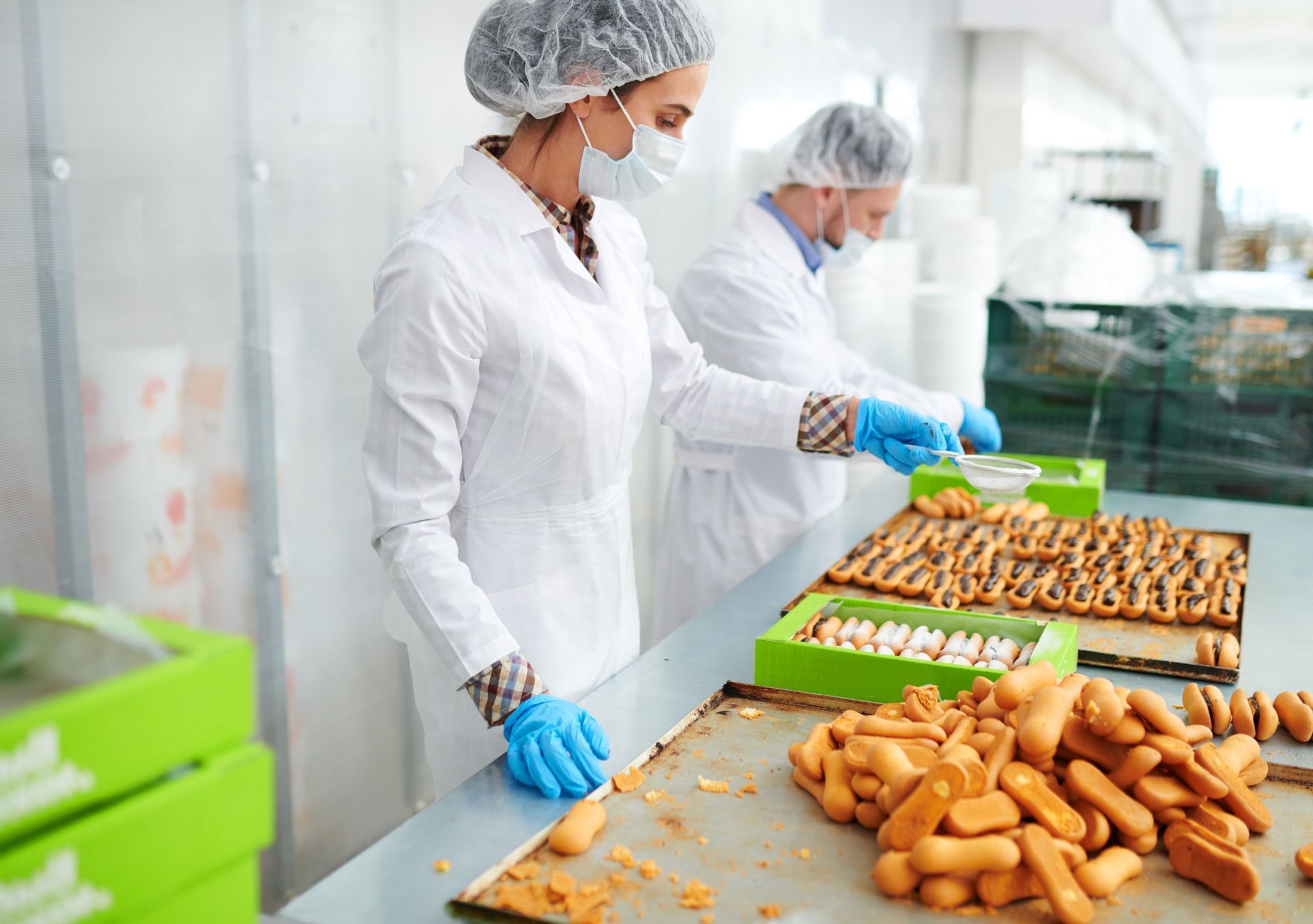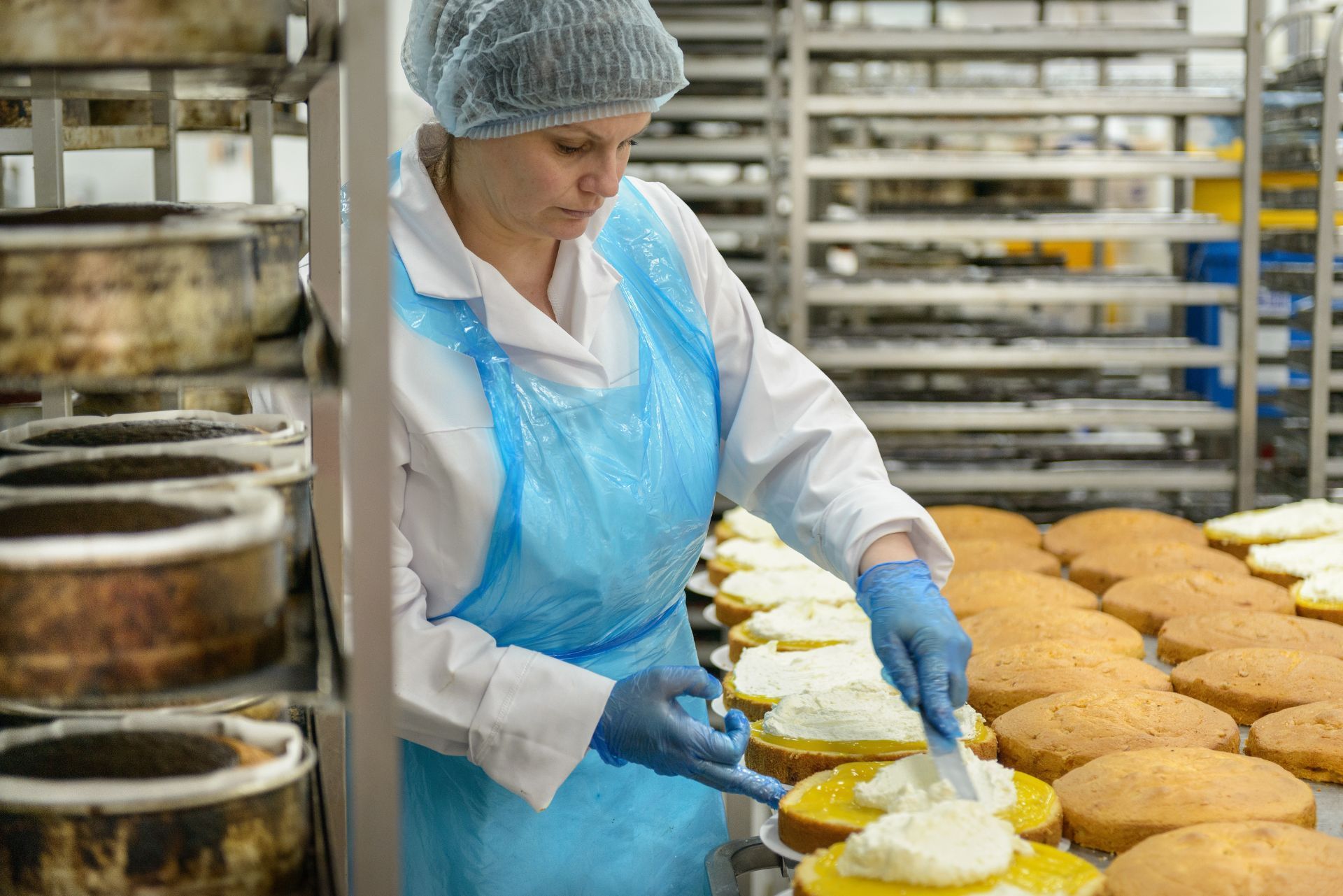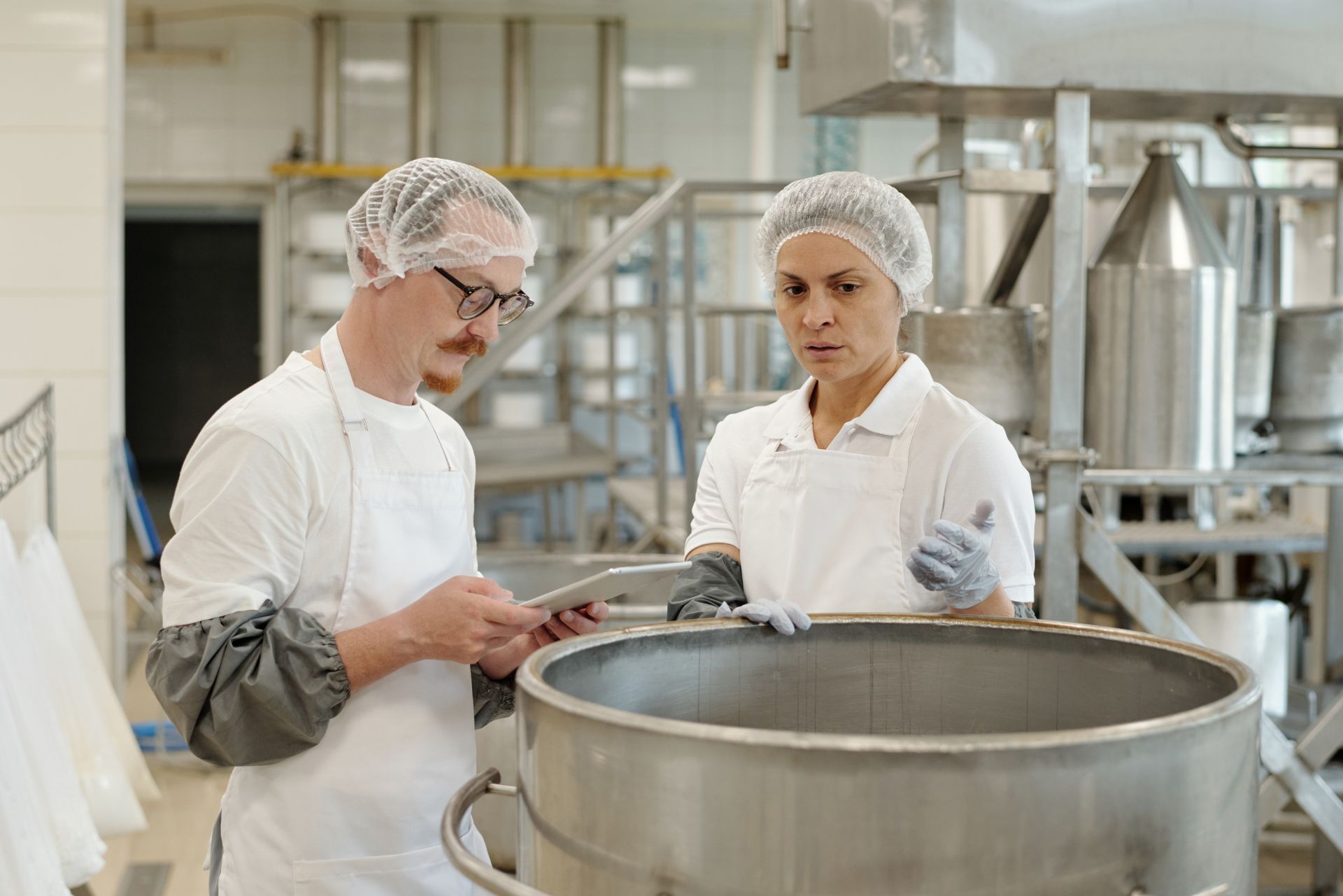Arizona Food and Beverage Manufacturer Insurance
See How We're Different:
or Call Us:(480) 526-3222

Most Common Business Policies
Index
Understanding Food and Beverage Manufacturer Insurance
Regulatory Considerations in Arizona
Types of Risks Faced by Food and Beverage Manufacturers
Choosing the Right Insurance Provider
Cost Factors in Food and Beverage Manufacturer Insurance
Claims Process for Food and Beverage Manufacturers
Best Practices for Risk Management
Emerging Trends in Food and Beverage Manufacturing Insurance
Contact Us
In the vibrant landscape of Arizona's food and beverage industry, manufacturers face unique challenges and risks that necessitate specialized insurance coverage. Understanding the intricacies of food and beverage manufacturer insurance is crucial for safeguarding your business against unforeseen events. This comprehensive guide delves into everything you need to know about securing the right insurance for your Arizona-based food and beverage manufacturing operation.
Understanding Food and Beverage Manufacturer Insurance
Food and beverage manufacturer insurance is designed to protect businesses involved in the production, processing, and distribution of food and drinks. This type of insurance encompasses various coverage options tailored to the specific needs of manufacturers in this sector.
Why Insurance is Essential for Food and Beverage Manufacturers
The food and beverage industry is inherently risky, with potential liabilities arising from product recalls, foodborne illnesses, and equipment failures. Without adequate insurance, a single incident could jeopardize a company's financial stability. Insurance not only provides financial protection but also enhances credibility with customers and suppliers. Furthermore, it can serve as a vital tool for navigating regulatory compliance, as many jurisdictions require manufacturers to carry specific types of insurance to operate legally. This compliance not only protects the business but also reassures consumers that they are purchasing products from a responsible and trustworthy source.
Key Coverage Options
Food and beverage manufacturers can benefit from a range of insurance coverages, including:
- General Liability Insurance: Protects against claims of bodily injury or property damage arising from your products or operations.
- Product Liability Insurance: Offers coverage for claims related to foodborne illnesses or injuries caused by your products.
- Property Insurance: Covers damage to your manufacturing facility and equipment due to fire, theft, or natural disasters.
- Workers' Compensation Insurance: Provides benefits to employees who suffer work-related injuries or illnesses.
In addition to these fundamental coverage options, manufacturers may also consider specialized policies such as contamination coverage, which protects against losses resulting from accidental contamination of products. This is particularly important in an industry where even minor lapses in quality control can lead to significant financial losses and damage to brand reputation. Moreover, businesses might explore business interruption insurance, which can help mitigate losses during periods when production is halted due to unforeseen circumstances, such as natural disasters or equipment breakdowns. Such comprehensive coverage ensures that manufacturers are not only protected against immediate financial impacts but also equipped to recover and thrive in the long term.

Regulatory Considerations in Arizona
Arizona's food and beverage manufacturers must navigate a complex regulatory environment that impacts their insurance needs. Compliance with state and federal regulations is paramount, and understanding these requirements can help in selecting the appropriate insurance coverage.
Food Safety Regulations
The Arizona Department of Health Services oversees food safety regulations, ensuring that manufacturers adhere to strict guidelines. Non-compliance can lead to fines, product recalls, and lawsuits, making it essential to have adequate insurance coverage to mitigate these risks. In addition to state regulations, manufacturers must also comply with federal standards set by the Food and Drug Administration (FDA), which can include inspections and adherence to Hazard Analysis Critical Control Point (HACCP) plans. These comprehensive safety protocols not only protect consumers but also enhance the manufacturer's reputation in a competitive market.
Licensing and Permits
Manufacturers in Arizona must obtain various licenses and permits to operate legally. These requirements can vary based on the type of products being produced. Insurance providers often consider compliance with these regulations when assessing risk and determining coverage options. For instance, a manufacturer producing alcoholic beverages may face more stringent licensing requirements compared to those producing non-alcoholic items. Additionally, staying updated on changes in local ordinances or state laws is crucial, as non-compliance can lead to operational shutdowns or increased insurance premiums. Regular training and workshops offered by industry associations can be invaluable resources for manufacturers to ensure they remain compliant and informed about the latest regulatory changes.
Types of Risks Faced by Food and Beverage Manufacturers
Food and beverage manufacturers encounter a multitude of risks that can impact their operations. Understanding these risks is crucial for selecting the right insurance coverage. The landscape of food production is complex, and manufacturers must navigate a variety of challenges that can arise at any stage of the supply chain, from sourcing raw materials to distributing finished products. By being aware of these risks, manufacturers can better prepare themselves to mitigate potential losses and safeguard their businesses.
Product-Related Risks
Product recalls can be devastating for manufacturers, both financially and reputationally. Issues such as contamination, labeling errors, or misbranding can lead to significant legal liabilities. For instance, a recall due to foodborne pathogens can not only lead to immediate financial losses but can also result in long-term damage to a brand's reputation. Having product liability insurance can help cover the costs associated with recalls and legal defenses. Moreover, manufacturers must also invest in rigorous quality control measures and regular audits to minimize the risk of such incidents occurring in the first place, ensuring that their products meet the highest safety standards.
Operational Risks
Operational risks include equipment breakdowns, supply chain disruptions, and workplace accidents. These incidents can halt production and lead to financial losses. For example, a malfunctioning piece of machinery can lead to costly repairs and extended downtime, while supply chain issues, such as delays in receiving raw materials, can disrupt the entire production schedule. Business interruption insurance can provide coverage for lost income during periods of downtime. Additionally, manufacturers should consider implementing comprehensive training programs for employees to enhance workplace safety and reduce the likelihood of accidents, as well as investing in preventive maintenance for equipment to ensure smooth operations. By proactively addressing these operational risks, manufacturers can maintain a more resilient production environment and enhance their overall efficiency.
Choosing the Right Insurance Provider
Selecting the right insurance provider is a critical step in ensuring comprehensive coverage for your food and beverage manufacturing business. A knowledgeable provider can help navigate the complexities of the industry and tailor a policy to meet specific needs. With the ever-evolving landscape of regulations and standards, having an insurer who understands these nuances can make a significant difference in safeguarding your operations and assets.
Assessing Experience and Expertise
When evaluating insurance providers, consider their experience in the food and beverage sector. A provider with a deep understanding of industry-specific risks will be better equipped to offer relevant coverage options and advice. Look for providers that have a proven track record of working with businesses similar to yours, as they will likely be familiar with the challenges you face, from supply chain disruptions to food safety compliance. Additionally, inquire about their claims handling process; a provider with a strong reputation for efficient claims support can save you time and stress when you need it most.
Comparing Coverage Options
It's essential to compare coverage options from multiple providers. Look for policies that offer comprehensive protection against the unique risks faced by food and beverage manufacturers. Pay attention to exclusions, limits, and deductibles to ensure you fully understand the coverage being offered. Consider additional endorsements or riders that may enhance your policy, such as coverage for product recalls or contamination, which can be particularly devastating in this industry. Furthermore, evaluating the financial stability and customer service reputation of each provider can provide insight into their reliability and commitment to supporting your business in times of need.
As you delve deeper into your options, don't overlook the importance of understanding the regulatory environment that affects your business. Insurance providers that stay updated on local, state, and federal regulations can offer invaluable guidance, helping you to maintain compliance while minimizing risks. Engaging in discussions about risk management strategies can also be beneficial; a proactive approach to identifying and mitigating potential hazards can lead to lower premiums and improved safety standards within your operations.

Cost Factors in Food and Beverage Manufacturer Insurance
The cost of insurance for food and beverage manufacturers can vary widely based on several factors. Understanding these factors can help businesses budget effectively for their insurance needs.
Business Size and Revenue
Larger businesses with higher revenues typically face higher insurance premiums. Insurers often assess the scale of operations when determining risk levels. Smaller manufacturers may benefit from lower premiums but should still ensure adequate coverage for their specific risks. Additionally, as a business grows, it may encounter new liabilities and operational complexities that necessitate a more comprehensive insurance strategy. For example, a small craft brewery that expands into multiple locations may need to reevaluate its coverage to include property insurance for each site, as well as liability coverage that accounts for increased customer interactions and product distribution.
Type of Products Manufactured
The nature of the products being produced can significantly influence insurance costs. High-risk products, such as those requiring refrigeration or those with a history of recalls, may attract higher premiums. Conversely, lower-risk products might result in more favorable rates. Furthermore, the ingredients used can also play a role; for instance, products containing allergens or those that are prone to spoilage may require additional coverage. Manufacturers must also consider the regulatory environment surrounding their products, as compliance with health and safety standards can impact insurance costs. For example, a manufacturer producing organic snacks may face different underwriting criteria compared to a conventional snack producer, reflecting the unique risks associated with organic certification and potential liability related to ingredient sourcing and labeling. Understanding these nuances can help manufacturers make informed decisions about their insurance policies and ensure they are adequately protected against potential claims and losses.
Claims Process for Food and Beverage Manufacturers
Understanding the claims process is vital for food and beverage manufacturers to ensure they can effectively navigate any incidents that arise. A smooth claims process can minimize disruptions and financial losses. Familiarity with the nuances of the claims process not only helps in expediting resolutions but also empowers manufacturers to make informed decisions that can safeguard their operations in the long run.
Reporting Incidents
In the event of an incident, manufacturers should promptly report the situation to their insurance provider. Delays in reporting can complicate the claims process and may result in denied claims. Keeping detailed records and documentation can aid in the claims process. This includes photographs of the incident, witness statements, and any relevant correspondence. Additionally, manufacturers should have a clear internal protocol for incident reporting, ensuring that all employees are aware of the steps to take when an issue arises. This proactive approach not only streamlines the claims process but also reinforces a culture of accountability and safety within the organization.
Working with Adjusters
Insurance adjusters play a crucial role in assessing claims. They will investigate the incident, evaluate damages, and determine the compensation amount. Manufacturers should cooperate fully with adjusters and provide any necessary documentation to facilitate the claims process. It is also beneficial for manufacturers to understand the adjuster's perspective; they are tasked with ensuring that claims are legitimate and that the compensation requested aligns with industry standards. Open communication can foster a positive working relationship, which may lead to a more favorable outcome. Furthermore, manufacturers should consider the importance of having a dedicated claims manager or legal advisor who can navigate the complexities of the insurance landscape, ensuring that all aspects of the claim are addressed thoroughly and efficiently.
Best Practices for Risk Management
Implementing effective risk management strategies can help food and beverage manufacturers minimize potential liabilities and reduce insurance costs. Proactive measures can lead to safer operations and lower premiums. By fostering a culture of safety and accountability, companies can not only protect their assets but also enhance their reputation in the marketplace, attracting more customers who value quality and safety in their food choices.
Regular Training and Safety Protocols
Establishing regular training sessions for employees on safety protocols can significantly reduce workplace accidents. Additionally, implementing strict hygiene and food safety practices can help mitigate risks associated with product contamination. Training should include not only the fundamentals of safety but also the latest industry standards and regulations, ensuring that employees are well-informed and prepared to handle potential hazards. Furthermore, incorporating hands-on training and simulations can enhance retention and application of safety practices in real-world scenarios, fostering a more vigilant workforce.
Quality Control Measures
Implementing robust quality control measures throughout the production process can help identify potential issues before they escalate. Regular inspections and testing can ensure that products meet safety standards, reducing the likelihood of recalls and associated liabilities. In addition to routine quality checks, adopting technology such as real-time monitoring systems can provide immediate feedback on production quality, allowing for swift corrective actions. Engaging employees in the quality assurance process not only empowers them but also cultivates a shared responsibility for maintaining high standards, which can lead to a more cohesive and motivated team dedicated to excellence in production.
Emerging Trends in Food and Beverage Manufacturing Insurance
The food and beverage industry is continually evolving, and so are the insurance needs of manufacturers. Staying informed about emerging trends can help businesses adapt their insurance strategies accordingly.
Sustainability and Environmental Risks
As sustainability becomes a priority for consumers and regulators alike, food and beverage manufacturers are increasingly focusing on environmentally friendly practices. This shift may introduce new risks related to compliance and sustainability claims, necessitating specialized insurance coverage. For instance, manufacturers are now investing in renewable energy sources and sustainable packaging, which not only reduces their carbon footprint but also aligns with consumer expectations. However, these initiatives can lead to unforeseen liabilities, such as the potential for product recalls if sustainable materials do not meet safety standards. Thus, it is crucial for manufacturers to work closely with their insurance providers to ensure that their policies reflect these evolving practices and associated risks.
Cybersecurity Risks
With the rise of technology in food and beverage manufacturing, cybersecurity risks are becoming more prevalent. Manufacturers must protect sensitive data, including customer information and proprietary recipes. Cyber liability insurance can provide coverage against data breaches and cyberattacks. Additionally, the integration of Internet of Things (IoT) devices in production lines has increased the attack surface for cyber threats, making it essential for manufacturers to implement robust cybersecurity measures. Regular training for employees on recognizing phishing attempts and securing sensitive information is becoming a standard practice. Furthermore, as regulations around data protection tighten globally, manufacturers may find themselves needing to adapt their policies to comply with laws like the General Data Protection Regulation (GDPR) in Europe, which adds another layer of complexity to their insurance needs.
Conclusion
In conclusion, food and beverage manufacturer insurance is a vital component of risk management for businesses operating in Arizona's dynamic industry. By understanding the various coverage options, regulatory considerations, and emerging trends, manufacturers can make informed decisions to protect their operations. Investing in the right insurance not only safeguards against potential liabilities but also enhances the overall resilience and credibility of the business.
As the food and beverage landscape continues to evolve, staying proactive in risk management and insurance coverage will be essential for long-term success. Whether you're a small artisan producer or a large-scale manufacturer, ensuring that you have the right insurance in place is crucial for navigating the complexities of this vibrant industry.
